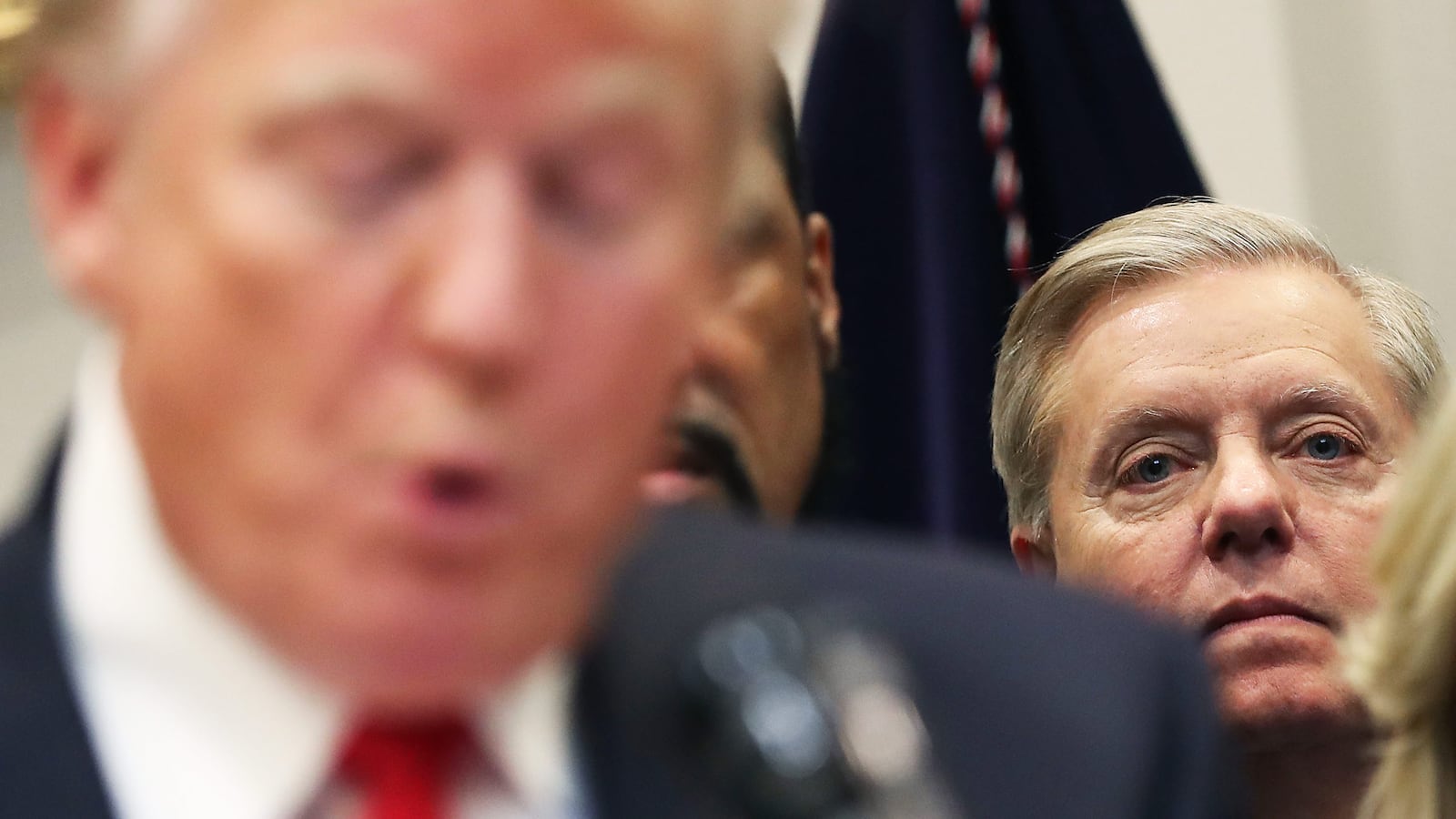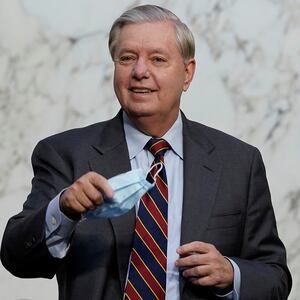At a rally a week before the toughest election of his career, Sen. Lindsey Graham (R-SC) did something he often does on the stump: invoke his famous relationship with President Donald Trump.
“We got off to a rocky start. He beat me pretty badly,” Graham told the assembled crowd in Greenville, South Carolina, on Tuesday, referencing his failed 2016 White House bid. But, these days, Graham added, “we’ve got something in common; I like him and he likes him.”
The senator has made that same self-deprecating crack many times before. But given the setting on Tuesday, it took on a fresher—and perhaps sharper—meaning, thanks to Graham’s company in Greenville.
A powerful White House figure indeed flew in to buck up Graham during the political fight of his life, but it wasn’t his pal Trump. It was Vice President Mike Pence.
Indeed, Trump himself has not visited South Carolina to support his erstwhile ally, and likely will not before the Nov. 3 election, when Graham faces Democrat Jaime Harrison. A former chair of the state’s Democratic Party, Harrison entered the race a long shot but has turned the Senate contest into a toss-up race, after raising a record $100 million sum for his campaign from a national liberal base that detests Graham.

U.S. senate candidate Jaime Harrison is giving Lindsey Graham a tough challenge.
Sean Rayford/GettyOn one level, Trump’s absence from South Carolina may seem unusual. Graham not only votes with Trump but golfs with Trump, and he has been perhaps his most visible defender in the Senate, where he’s frequently asked by reporters for special insights into the president’s various plans and moods. And the president has traveled across the country to stump for Senate candidates who are far less close to him than Graham.
But Trump is facing a tough election, too, and far longer odds to win than Graham—meaning his time is better spent not in reliably red South Carolina but in battleground states such as Iowa, North Carolina, and Michigan that he must win in order to get a second term. And despite Graham’s closeness with Trump, some say that the senator may not want to deal with a presidential visit and all the political connotations that come with it.
“I think if anything, he's probably wanting to be quiet on the Trump front, though he's obviously been a fan, in hopes that he picks up some measure of support from suburban or working women that have been lost or some of the young millennials that have been lost,” said former South Carolina Governor Mark Sanford, who briefly launched a primary challenge against Trump. Sanford declined to say if he planned to vote for Graham.
Beyond that, local Republicans say that a Trump visit is, in all likelihood, only a break-in-case-of-emergency option for Graham. “If we saw President Trump come,” said Nate Leupp, chairman of the Greenville County GOP, “we’d know there’s an issue with Lindsey Graham’s re-election.”
Even Pence’s visit, said Leupp, was more tantamount to a “pat on the back” and “loyalty thank-you” for Graham’s recent success in confirming Justice Amy Coney Barrett to the U.S. Supreme Court, a process Graham oversaw as Senate Judiciary Committee chairman. “I just don’t get a feeling that Graham is in trouble.”
Democrats don’t see it that way, of course. They don’t read too much into the fact that Trump has so far skipped South Carolina, and agree that if Air Force One were to touch down in the state, it’d mean Harrison has a far better shot than they realized.
An appearance by Trump before election day would be “very bad” for Graham, said Clay Middleton, a DNC committeeman in South Carolina and Harrison adviser, because Trump “is not getting any more people into his camp at all, and that’s the reality.”
Many believe that Pence’s appearance alone was a reflection of GOP concern about Graham’s chances. Brady Quirk-Garvan, the former chairman of the Democratic Party in Charleston, likened Pence’s visit to deep red Greenville to a Democratic vice president going to the heart of San Francisco to rally for a Democratic candidate. The last time a GOP president or vice president came to campaign for a politician in deep red South Carolina was 2002, when George W. Bush stumped for Sanford during his first run for governor.
“It’s clearly a sign they’re most worried about die-hard Republicans coming home,” said Quirk-Garvan. “They're still concerned there are some Republicans out there who are gonna skip this line, or vote for the third-party candidate, or write in someone.”
And Trump’s absence doesn’t mean that Graham and Republicans aren’t giving off an air of desperation—at least strategically. Graham, a fixture on Fox News primetime, has hardly let a single appearance slide without asking viewers to donate to his campaign; during the Barrett hearings, he notably solicited donations in front of the press cameras outside the Judiciary Committee chambers.
“He’s trying to pretend in-state he’s not in danger, while on national TV, he’s desperate for money,” said Quirk-Garvan.
The South Carolina race has emerged as the biggest wildcard on the Senate map this election cycle. Harrison has proven to be an especially strong recruit, and a prodigious fundraiser; his $108 million haul through October has shattered fundraising records for a U.S. Senate candidate, and his ads have swamped every TV, phone, and laptop in the state for months.
But given the overwhelming likelihood that Trump wins South Carolina, Harrison will need to run far ahead of Democratic nominee Joe Biden in order to win the state. That would mean winning over at least some number of Trump voters.
A Quinnipiac University poll released in late September showed Graham and Harrison tied with 48 percent of the vote. But a New York Times/Siena College poll released in mid-October showed Graham with a 6-point lead on Harrison, while Trump was beating Biden in the state by 8 points.
A victory by Harrison in South Carolina would likely be a sign of deep Republican woes on election night. “Nothing’s going to help him, if it’s a tidal wave the other way” said Larry Kobrovsky, a former chairman of the Charleston County GOP. “If Lindsey truly is in danger of losing, I don’t know if an additional visit would matter.”
While Trump’s campaign is likely to keep him strictly headed to places where his appearance will have the biggest impact on his chances, some Republicans have been flummoxed by his recent visits to less competitive states that he lost in 2016, like New Hampshire and Nevada, as well as his past decisions to hold rallies in solidly red places like Oklahoma.
The Graham campaign and a spokesperson for the Trump campaign did not respond to requests for comment from The Daily Beast.
A week out from the Senate election, Mike Page, chairman of the Florence County Republican Party, was clear “the race is tight.”
“Any help that Senator Lindsey Graham could get would be wonderful," he said.
But even though he predicted a Trump appearance would get “a massive amount of turnout,” Page wasn’t bothered by Trump not coming to town.
“I know exactly where Trump is and how he feels about us, and he's got bigger fish to fry than South Carolina,” Page said.




